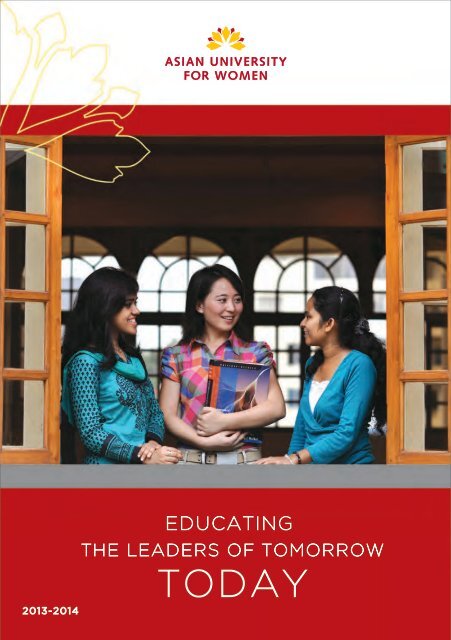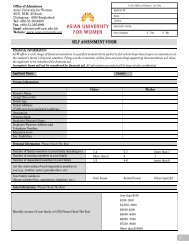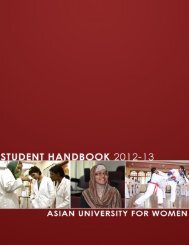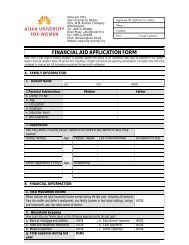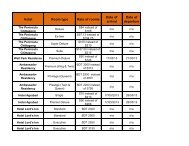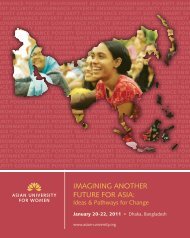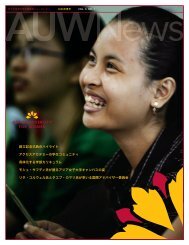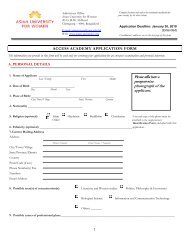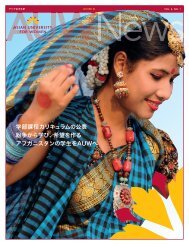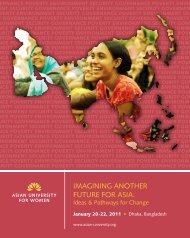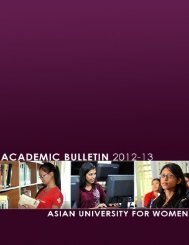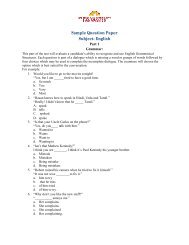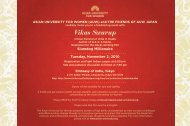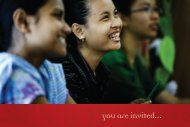2014 AUW Admission Prospectus (PDF) - Asian University for Women
2014 AUW Admission Prospectus (PDF) - Asian University for Women
2014 AUW Admission Prospectus (PDF) - Asian University for Women
You also want an ePaper? Increase the reach of your titles
YUMPU automatically turns print PDFs into web optimized ePapers that Google loves.
EDUCATING<br />
THE LEADERS OF TOMORROW<br />
TODAY<br />
2013-<strong>2014</strong>
The <strong>Asian</strong> <strong>University</strong> <strong>for</strong> <strong>Women</strong> seeks<br />
to graduate women who will be skilled and innovative<br />
professionals, service-oriented leaders in the businesses<br />
and communities in which they will work and live,<br />
and promoters of intercultural understanding<br />
and sustainable human and economic development<br />
in Asia and throughout the world.<br />
Front Cover: Left to Right<br />
Fayeka Zabeen Siddiqua Mingzhu Ha Gangodawilage Nimanthi<br />
Undergraduate Year 4 Undergraduate Year 3 Undergraduate Year 2<br />
Major: <strong>Asian</strong> Studies Major: Environmental Sciences Major: Environmental Sciences<br />
Country: Bangladesh Country: China Country: Sri Lanka
<strong>AUW</strong><br />
1<br />
Table of Contents<br />
Extraordinary <strong>Women</strong> & Their Voices 6<br />
Academic Programs 10<br />
Collaborative Programs, Summer Research<br />
And Co-Curricular Activities 14<br />
<strong>Admission</strong>s, Scholarships & Financial Assistance 20<br />
Career Development Center 22<br />
Deans 26<br />
Faculty 27<br />
Access Academy 32<br />
Residential Life 36<br />
Campus Resources 38<br />
Student Activities 40
Dr. Fahima Aziz<br />
Vice Chancellor<br />
Greetings from the <strong>Asian</strong> <strong>University</strong> <strong>for</strong> <strong>Women</strong> (<strong>AUW</strong>). At <strong>AUW</strong>, you will not only receive<br />
world-class academic instruction; there will be opportunities <strong>for</strong> internships, independent<br />
projects, building relationships with mentors, study abroad programs, extra-curricular<br />
activities, and much more. But perhaps most importantly, at <strong>AUW</strong> you will find a diverse<br />
community of young women who share your passions and dreams.<br />
Your extraordinary peers will inspire you, challenge you and support you throughout your<br />
educational journey. They come from twelve countries and aspire to be teachers, doctors,<br />
scientists, government officials, social activists, diplomats, politicians, and prime ministers.<br />
They seek to erode the narrow identities that engender conflict and violence, and replace<br />
them with an ethos of tolerance and peace. Masooma Maqsoodi, a second-year<br />
undergraduate student from Afghanistan, wrote of her experience: “Life at <strong>AUW</strong> teaches us<br />
to grow reverence <strong>for</strong> each other’s values and concern <strong>for</strong> each other’s problems. We will<br />
become leaders and educators of tomorrow and we will take these messages with us to our<br />
communities and to the outside world”.<br />
Our dedicated professors come from world-renowned institutions to share their expertise<br />
and experiences, and guide our students as they embark on their exciting educational<br />
journeys. From environmental science to literary theory, <strong>AUW</strong>’s curriculum is based on the<br />
solid foundation of a broad liberal arts education that empowers students to think<br />
independently and develop the skills that they will need to be leaders in their fields and be<br />
engaged citizens in their communities. Our innovative Access Academy program allows us<br />
to serve women whose educational backgrounds have not prepared them <strong>for</strong> the rigorous<br />
university-level work at <strong>AUW</strong>, but who have demonstrated talent and promise. In the Access<br />
Academy, they receive intensive instruction in English, mathematics, global history,<br />
technology skills, and physical education <strong>for</strong> 11 months be<strong>for</strong>e going on to our four-year<br />
undergraduate program. These are the kinds of incredible young women who will make up<br />
your community at <strong>AUW</strong>, women determined to succeed and women whose voices<br />
demand to be heard.<br />
Our students have worked at the World Bank, Democracy International, Starbucks, the<br />
Afghan Ministry of Counter Narcotics, and the The Daily Star. They have received<br />
scholarships to study abroad at Philips Exeter Academy and Stan<strong>for</strong>d <strong>University</strong> in the<br />
United States, the Paris Institute of Political Studies in France, and the <strong>University</strong> of Trento<br />
in Italy. And they have participated in leadership trainings with world-renowned scholars<br />
and political activists. As we look <strong>for</strong>ward to the graduation of our first class in May 2013, we<br />
are confident that they will fulfill their dreams of changing their communities <strong>for</strong> the better.<br />
We believe that by accepting this opportunity at <strong>AUW</strong>, the region's most talented, promising<br />
young women, women like you, can impact the lives of many others. We invite you to join<br />
our community of tomorrow’s leaders.
<strong>AUW</strong><br />
3<br />
Rehana Alam Khan<br />
Director of <strong>Admission</strong>s<br />
and Student Recruitment<br />
Education is the bedrock of social and economic development. Today's college students<br />
want an educational system which goes beyond the mere acquisition of bookish<br />
knowledge, one which develops self-discipline and leadership skills, provides courage and<br />
confidence to take on challenges, develops an analytical and inquiring approach to<br />
problems and above all makes a good human being.<br />
The <strong>Asian</strong> <strong>University</strong> <strong>for</strong> <strong>Women</strong> (<strong>AUW</strong>) seeks to graduate women who will be skilled and<br />
innovative professionals, service-oriented leaders in the businesses and communities in<br />
which they will work and live, and promoters of intercultural understanding and sustainable<br />
human and economic development in Asia and throughout the world.<br />
At <strong>AUW</strong>, we prepare our students <strong>for</strong> their roles as global citizens by offering an intellectually<br />
challenging liberal arts undergraduate curriculum leading to Bachelor of Arts and Bachelor<br />
of Science degrees. Our undergraduate program blends the best of liberal arts education<br />
into a curriculum that speaks to Asia and beyond. We aim to prepare competent leaders <strong>for</strong><br />
the future. We provide an education that extends beyond the parameters of the classroom<br />
curriculum, and the opportunity to hone leadership skills through engagements in<br />
societies, clubs and Student Government.<br />
As a student at <strong>AUW</strong>, you will live and attend classes with young women from twelve<br />
countries and from varied cultural and religious backgrounds. Your professors come from<br />
the best universities in the United States, Canada, Europe, Australia and Asia. <strong>Women</strong><br />
leaders like Anuradha Koirala and Dr. Kiran Bedi visit the university to speak and interact with<br />
our students as part of our Extraordinary <strong>Women</strong> & Their Voices seminar series. We provide<br />
opportunities <strong>for</strong> you to spend your summers engaged in research projects, internships and<br />
academic programs around the world. And we prepare you <strong>for</strong> graduate school, <strong>for</strong> careers<br />
and <strong>for</strong> leadership roles at the local, national and international level.<br />
This book will give you a glimpse into student life on our campus and thus help you make<br />
your decision. As you read about each of these young women, I hope you will see our<br />
<strong>University</strong>’s unique character reflected in our students’ extraordinary voices, profiles and<br />
goals. You can explore options in terms of different majors, our admissions requirements,<br />
financial aid options, residential life and hopefully provide all other in<strong>for</strong>mation that will<br />
assist you in making the decision to study at <strong>AUW</strong>.<br />
This is the time to spread your wings, to widen your social circle and nurture friendships<br />
bolstered by an education that will last a life time.
Afghanistan<br />
ENTRY YEAR<br />
Access Academy, 2010<br />
CURRENT YEAR<br />
Undergraduate Year 2<br />
<strong>AUW</strong> GRADUATION YEAR<br />
2015<br />
MAJOR<br />
Politics, Philosophy, and Economics<br />
2011–2012 COURSES<br />
World Literature, Writer As Activist, Social and Political<br />
Thought I and II, Anthropology of Religion, Religion and<br />
Identity, Pre-calculus, Calculus I<br />
EXTRA-CURRICULAR ACTIVITIES<br />
Co-founder of Afghan Youth Reading Association<br />
(AYRA), Member of CLAP Foundation, Environment in<br />
Action Club<br />
2012 SUMMER RESEARCH PROJECT<br />
Translated the Infant and Child Nutrition Manual <strong>for</strong><br />
Parents into Dari with the help of a group of Afghan<br />
students at <strong>AUW</strong> and working to get this manual<br />
published and distributed in Afghanistan<br />
2012 SUMMER ACADEMIC PROGRAM<br />
<strong>AUW</strong>’s <strong>Women</strong> in Public Service Project (WPSP)<br />
Summer Institute, 2012<br />
GRADUATE SCHOOL<br />
Sociology or International Relations<br />
Masooma Maqsoodi<br />
“I believe it is through high quality education that we can promote peace, raise awareness<br />
about social challenges, advocate religious or ethnic tolerance, eliminate poverty, and<br />
eradicate all kinds of discrimination, especially gender discrimination in human societies. I<br />
have chosen <strong>AUW</strong> to enjoy being empowered by such educational quality. <strong>AUW</strong> is where we<br />
are equipped with the skills, knowledge and insight that will prepare us, both as dedicated<br />
leaders and responsible citizens, to tackle regional and global challenges of our time.”
<strong>AUW</strong><br />
5<br />
Bangladesh<br />
ENTRY YEAR<br />
Access Academy, 2008<br />
CURRENT YEAR<br />
Undergraduate Year 4<br />
<strong>AUW</strong> GRADUATION YEAR<br />
2013<br />
MAJOR<br />
<strong>Asian</strong> Studies<br />
2011–2012 COURSES<br />
Cultural Psychology, Religion and Violence in Asia,<br />
Consumption, Culture and Politics in Asia<br />
EXTRA-CURRICULAR ACTIVITIES<br />
President and Founder of Center <strong>for</strong> Leadership<br />
Assistance & Promotion (CLAP) Foundation,<br />
Member of Youth Council of the U.S. Ambassador<br />
to Bangladesh, Mentor at <strong>AUW</strong> & <strong>University</strong> of<br />
Toronto Cyber-Mentorship Program<br />
2012 SUMMER RESEARCH PROJECT<br />
Gender Glitch: Promoting Gender Equality through<br />
Securing Civil Liberties <strong>for</strong> Hijra in Bangladesh,<br />
Comparative Analysis of Child Labor and<br />
Protection of Children’s Rights in Bangladesh<br />
GRADUATE SCHOOL<br />
Advance Study in Social Work or Development<br />
Studies<br />
Mowmita Basak<br />
“At <strong>AUW</strong> I had the chance to grow in a multi-cultural educational atmosphere, which has<br />
changed my life and with this education I hope to change the lives of others. My <strong>AUW</strong><br />
education not only equipped me with good academic proficiency but also reshaped my<br />
values, thoughts and perceptions. In my second year of the Undergraduate Program, I initiated<br />
a non-profit social welfare organization of youths called Center <strong>for</strong> Leadership Assistance &<br />
Promotion (CLAP) Foundation. CLAP Foundation aims to encourage leadership in our<br />
members while working on different social issues in Bangladesh. <strong>AUW</strong> has been a life-changing<br />
entity <strong>for</strong> me, where I was encouraged to dream big and to be the leader of Tomorrow.”
EXTRAORDINARY WOMEN & THEIR VOICES<br />
In April 2011, Dr. Kiran Bedi of India, the first and highest ranking<br />
woman officer in the Indian Police Service and winner of the Ramon<br />
Magsaysay Award, visited the <strong>AUW</strong> <strong>for</strong> two days and spoke to the<br />
students about being agents <strong>for</strong> positive change in the world. She<br />
encouraged them to visualize themselves as extraordinary, to craft<br />
their journeys, to stay on course, to constantly prepare <strong>for</strong> tomorrow,<br />
and to always give extra in everything they do. As part of their<br />
summer reading, each of our students went home with a copy of<br />
Kiran Bedi’s autobiography called, I DARE.<br />
DR. KIRAN BEDI<br />
The first <strong>AUW</strong> <strong>Women</strong> in Public Service Summer Institute was held at the<br />
<strong>Asian</strong> <strong>University</strong> <strong>for</strong> <strong>Women</strong> in Chittagong, Bangladesh, from August 1 –<br />
August 15, 2012. The Summer Institute was led by Dr. Rangita de Silva de<br />
Alwis (S.J.D.), Director of the <strong>Women</strong> in Public Service Project (WPSP)’s<br />
inaugural institute at Wellesley College. She will be heading the Global<br />
<strong>Women</strong>’s Leadership Initiative at the Woodrow Wilson Center <strong>for</strong><br />
International Scholars where she will direct the WPSP and the Council of<br />
<strong>Women</strong> World Leaders – a network of current and <strong>for</strong>mer women heads<br />
of state. Dr. De Silva and 43 exceptional <strong>AUW</strong> students, representing 12<br />
countries across Asia explored traditional gender roles, the impact of<br />
mentoring, women’s leadership as smart economics, and female social<br />
entrepreneurship.<br />
DR. RANGITA DE SILVA
<strong>AUW</strong><br />
7<br />
I slept and dreamt<br />
that life was joy.<br />
I awoke and saw<br />
that life was service.<br />
I acted and behold,<br />
service was joy.<br />
RABINDRANATH TAGORE
Pakistan<br />
ENTRY YEAR<br />
Access Academy, 2009<br />
CURRENT YEAR<br />
Undergraduate Year 3<br />
<strong>AUW</strong> GRADUATION YEAR<br />
<strong>2014</strong><br />
MAJOR<br />
<strong>Asian</strong> Studies<br />
2011–2012 COURSES<br />
Migration, Gender in Asia, Cultural Psychology, Religion<br />
and Violence in Asia<br />
EXTRA-CURRICULAR ACTIVITIES<br />
Member of Communication and Coordination Committee<br />
of Hareep Pakistan, Working with Aga Khan Council as<br />
a member of Communication and Coordination Committee<br />
in Chittagong and Dhaka, Member of CLAP Foundation,<br />
Country Representative of Pakistan at <strong>AUW</strong>, Business<br />
Entrepreneur Club<br />
2012 SUMMER RESEARCH PROJECT<br />
Research based on “Pakistani Migrants In Arab countries”<br />
2012 SUMMER INTERNSHIP<br />
Agility Logistics, Islamabad Pakistan<br />
Shakila Bano<br />
“I strongly feel the injustice happening around me. I have seen discrimination in the name of<br />
religion, culture, caste, language and gender which can also be addressed as structural<br />
violence especially in Asia. It is really important to take these issues seriously and come up<br />
with solutions. I strongly believe that liberal education can play a vital role in order to bring<br />
harmony and peace among different ideologies. My goal in life is to eliminate structural<br />
violence and create peace through providing liberal education to the people and promoting<br />
awareness about art and culture so that people come closer to each other and understand<br />
differences.”
<strong>AUW</strong><br />
9<br />
Sri Lanka<br />
ENTRY YEAR<br />
Access Academy, 2008<br />
CURRENT YEAR<br />
Undergraduate Year 4<br />
<strong>AUW</strong> GRADUATION YEAR<br />
2013<br />
MAJOR<br />
Politics, Philosophy, and Economics<br />
2011–2012 COURSES<br />
Econometrics, Labor Economics, Global Justice, Civil Society and<br />
Social Movements, Humanitarianism and Politics, Urban<br />
Challenge & Poverty, Politics in South Asia, Principles of<br />
Macro-economics, Violence and Ethics, The State of Nature and<br />
The Nature of the State<br />
EXTRA-CURRICULAR ACTIVITIES<br />
Member of <strong>AUW</strong> UN Youth and Student Association of<br />
Bangladesh (UNYSAB): <strong>AUW</strong> Chapter, Science Club, Debate Club,<br />
Model UN Club<br />
2012 SUMMER ACADEMIC PROGRAM<br />
<strong>AUW</strong>’s <strong>Women</strong> in Public Service Project (WPSP) Summer<br />
Institute, 2012. As a follow-up action plan, currently working on<br />
establishing leadership chapters named ‘Daughters of Nation’ in<br />
girls’ schools in Sri Lanka<br />
2012 SUMMER INTERNSHIP<br />
Toshiba and Dentsu, Japan<br />
GRADUATE SCHOOL<br />
Ph.D. in Public Policy<br />
Ganga Silva Gunarathne<br />
“Dreams are the roots of making the Impossible possible. Hence, I dream <strong>for</strong> a change, a<br />
change that will make us see the world in open eyes beyond the meaningless differences,<br />
make us discover the social impediments that inhibit humankind as a whole, make us take<br />
initiative to unveil the obstructive stereotypical customs and traditions in our own<br />
societies, and finally make us fight to achieve both the individual and collective rights of<br />
women and children so that they can stand and walk freely with pride and dignity.”
ACADEMIC PROGRAMS<br />
The undergraduate program offered at <strong>Asian</strong> <strong>University</strong> <strong>for</strong> <strong>Women</strong> seeks to blend the best of liberal arts<br />
educational traditions into a curriculum that speaks to Asia. Through our curriculum and course offerings we seek<br />
to develop – in each student – creativity of thought and vision, critical thinking and reasoning skills, exceptional<br />
writing and speaking skills, and love of learning. We also aim to prepare students <strong>for</strong> graduate study, careers, and<br />
leadership roles at the local, national, and international levels.<br />
UNDERGRADUATE CURRICULUM<br />
The undergraduate curriculum consists of four years of study and offers students an exceptional liberal arts and<br />
sciences education. The integration of both abstract and applied studies encourages students to link theoretical<br />
understanding with contemporary issues and challenges facing Asia and the world.<br />
The key components of the curriculum are as follows:<br />
• Humanities and natural and social sciences establish a broad base of inquiry (14 courses in the core curriculum),<br />
• Disciplinary studies provide depth (16 courses in a major), and<br />
• Electives provide choice <strong>for</strong> students to explore their interests, write a senior thesis, and/or take courses to<br />
prepare <strong>for</strong> graduate study (minimum of 2 courses).<br />
The core curriculum follows a “modes of thought and reasoning” model and requires students to take two courses<br />
in social analysis, two courses in ethical reasoning, three courses in literature, civilization studies, and the arts, three<br />
courses in science and mathematics, one course on regional challenges in Asia, and two writing and rhetoric<br />
intensive seminars. In each of these categories, a student may choose from among four to nine different courses.<br />
We offrer five majors leading to either a Bachelor of Arts or a Bachelor of Science degree. These are:<br />
• <strong>Asian</strong> Studies (B.A.)<br />
• Biological Sciences (B.S.)<br />
• Environmental Sciences (B.S.)<br />
• Politics, Philosophy, and Economics (B.A.)<br />
• Public Health Studies (B.S.)<br />
Examples of courses are shown on the facing page.
<strong>AUW</strong><br />
11<br />
SUMMER RESEARCH PROJECTS,<br />
ACADEMIC STUDY, AND INTERNSHIPS<br />
<strong>AUW</strong> offers opportunities <strong>for</strong> students to<br />
participate in applied research projects and<br />
study programs during the summer. A typical<br />
sequence of summers might include an applied<br />
research project during the first summer, an<br />
international study program and/or an<br />
internship during the second summer, and an<br />
internship during the third summer.<br />
Subsequent pages provide examples of<br />
research projects and internships opportunities.<br />
GRADUATE PROGRAMS<br />
We prepare our students to compete <strong>for</strong><br />
admittance and scholarships to the best<br />
graduate programs around the world in public<br />
health, biology, environmental engineering and<br />
sustainable development, economics, politics,<br />
philosophy, public policy, international relations,<br />
law, and journalism to name just a few. We have<br />
the Career Development Center that helps<br />
students become aware of their options <strong>for</strong><br />
graduate school and assists them throughout<br />
the application process.<br />
CORE CURRICULUM<br />
Social Analysis<br />
Mind and Behavior<br />
Social Inquiry<br />
Social & Political Thought I, II<br />
Literature, Civilization<br />
Studies & the Arts<br />
World Literature I, II<br />
History of Modern Asia<br />
Introduction to <strong>Asian</strong> Religions<br />
World History I, II<br />
Photography<br />
History of South Asia I, II<br />
Southeast <strong>Asian</strong> History<br />
Arabian Nights in Literature<br />
and Culture<br />
<strong>Asian</strong> Dramatic Culture<br />
Ethical Reasoning<br />
Introduction to Ethics<br />
Ethics of Humanitarian Intervention<br />
Ethics and International Relations<br />
Introduction to Bioethics<br />
Global Health Ethics<br />
Science & Mathematics<br />
Calculus I, II<br />
Differential Equations<br />
Probability & Statistics<br />
Linear Algebra<br />
Biology I, II<br />
General Chemistry I, II<br />
Organic Chemistry<br />
Physics I, II<br />
Writing & Rhetoric Seminars<br />
These writing and rhetoric intensive<br />
seminars are built around literary,<br />
philosophical, historical, artistic,<br />
political, and social themes.<br />
Examples include:<br />
Banned Books<br />
Human Rights<br />
Art of the Personal Essay<br />
Regional Challenges<br />
Urban Challenges and Poverty<br />
Environmental Challenges in Asia<br />
Public Health Challenges in Asia<br />
Law and Human Rights in Asia<br />
MAJORS<br />
<strong>Asian</strong> Studies (AS)<br />
<strong>Asian</strong> Literature & the Arts<br />
World & <strong>Asian</strong> History<br />
<strong>Asian</strong> Religions and Philosophy<br />
<strong>Asian</strong> Politics and<br />
International Relations<br />
Development Studies in Asia<br />
Chinese Language<br />
Biological Sciences (BS)<br />
Cell & Developmental Biology<br />
Genetics & Genomics<br />
Biochemistry<br />
Microbiology<br />
Anatomy & Physiology<br />
Environmental Sciences (ES)<br />
Environmental Chemistry and Toxicology<br />
Earth Science<br />
Ecology<br />
Atmospheric & Oceanic Sciences<br />
Energy & Environment<br />
Natural Disasters<br />
Hydrology<br />
Environmental Hydraulics<br />
Microbiology<br />
Numerical Methods & Computer Programming<br />
Politics, Philosophy, & Economics (PPE)<br />
Microeconomics<br />
Intermediate Microeconomics<br />
Macroeconomics<br />
Intermediate Macroeconomics<br />
Econometrics<br />
Microeconomics of Development<br />
Labor Economics<br />
Comparative Politics<br />
International Relations<br />
Advanced International Relations<br />
Civil Society and Social Movements<br />
Government and Politics in South Asia<br />
Humanitarianism and Politics<br />
Politics of Development<br />
International Political Economy<br />
State of Nature and the Nature of the State<br />
Global Justice<br />
Public Health Studies (PH)<br />
Biostatistics<br />
Epidemiology<br />
Nutrition<br />
Public Health<br />
Health Policy & Management<br />
ELECTIVES<br />
Psychology<br />
Sociology<br />
Anthropology
Cambodia<br />
ENTRY YEAR<br />
Access Academy, 2008<br />
CURRENT YEAR<br />
Undergraduate Year 4<br />
<strong>AUW</strong> GRADUATION YEAR<br />
2013<br />
MAJOR<br />
Public Health Studies<br />
2011–2012 COURSES<br />
Human Anatomy, Public Health Challenge in Asia,<br />
Principles of Macroeconomics, Global Science Global<br />
Politics<br />
EXTRA-CURRICULAR ACTIVITIES<br />
Public Health Leadership Club, Yoga<br />
2012 SUMMER RESEARCH PROJECT<br />
Writing up the project paper about Education in<br />
Cambodia <strong>for</strong> a conference<br />
2012 SUMMER INTERNSHIP<br />
UNHCR, Cox’s Bazar, Bangladesh<br />
Sorya Seang<br />
“I believe education is the best way to explore the best qualities in one’s self. When I find my<br />
qualities, I believe I can fly. I try to understand what I do not know; I try to be the best of what<br />
I am good at. I know what my future is because I always have a dream. I dare to dream and to<br />
fly because of this Education.”
<strong>AUW</strong><br />
13<br />
China<br />
ENTRY YEAR<br />
Access Academy, 2011<br />
CURRENT YEAR<br />
Undergraduate Year 1<br />
<strong>AUW</strong> GRADUATION YEAR<br />
2016<br />
INTENDED MAJOR<br />
Politics, Philosophy, and Economics<br />
2011–2012 COURSES<br />
English Grammar, Composition, Reading<br />
and Writing, Pre-calculus, PE., Geography<br />
and World History<br />
EXTRA-CURRICULAR ACTIVITIES<br />
Member of CLAP Foundation, Poetry<br />
Club, Basketball<br />
2012 SUMMER RESEARCH PROJECT<br />
A short cultural documentation funded<br />
by the Firebird Foundation (Australia)<br />
2012 SUMMER ACADEMIC PROGRAMS<br />
Building A Better Chittagong (providing<br />
street baggers with job trainings)<br />
Yina<br />
“Everything is possible when you dare to give a try. I’ve accomplished my own cultural<br />
documentation name Warm Your Hands with Moonlight in English when I studied English<br />
only <strong>for</strong> two years. It seemed totally unachievable <strong>for</strong> me at the beginning, but it was my<br />
courage and persistence adhered to it. Let’s try <strong>for</strong> the things that you are scared or have<br />
no confidence of.”
COLLABORATIVE PROGRAMS, SUMMER RESEARCH<br />
AND CO-CURRICULAR ACTIVITIES<br />
<strong>AUW</strong> offers opportunities <strong>for</strong> students to participate in collaborative programs, applied research<br />
projects and co-curricular activities at home and abroad, which are meant to bridge the gap<br />
between classroom knowledge and local practice. These projects are typically carried out during<br />
the summer after the first undergraduate year, and may be continued during the academic year<br />
and into the following summer, whereas co-curricular activities are carried out throughout the year.<br />
Canada<br />
Journalism Workshop<br />
France<br />
Collaborative Program in Paris Institute of Political Studies<br />
Nepal<br />
Summer Projects:<br />
Translation of a Lay Infant and Child Nutrition Manual<br />
Girl Dropouts In Rural Nepal<br />
Menstruation, Nutrition, and Sanitation in Rural Parts of Nepal<br />
<strong>AUW</strong> Basketball Summer Projet Proposal: Sports Shaping<br />
Young Girls as Future Leaders<br />
Improving Infant Feeding and Young Child Growth in Nepal<br />
United States<br />
Summer Program at Stan<strong>for</strong>d <strong>University</strong><br />
Summer Program at Philips Exeter Academy<br />
Exchange Program at St. Catherine <strong>University</strong><br />
Leadership Program<br />
Conference<br />
Bangladesh<br />
Summer Projects:<br />
Conducting Participatory Research on Occupations of Street Children<br />
Usefulness of Biogas in Managing Organic Waste<br />
Bangladeshi Peacekeeping Forces<br />
Handicraft Artisans in Bangladesh: Economic and Skill Development<br />
Living and Working in Bangladesh from Non-Bangladeshi Perspectives<br />
Population Status of the Endangered Bostami Turtle<br />
(Aspideretes nigricans) in Chittagong<br />
Traditional Use of Zootherapeutics in Bangladesh<br />
Baseline Infant and Young Child Feeding and Undernutrition Survey<br />
in Raozan, Bangladesh<br />
Comparison of Attitudes Towards Corruption in Bangladesh and India<br />
Translation of a Lay Infant and Child Nutrition Manual<br />
U.A.E.<br />
Conference<br />
Qatar<br />
Conference
<strong>AUW</strong><br />
15<br />
United Kingdom<br />
Conference<br />
Afghanistan<br />
Summer Projects:<br />
Lightening in the Shadows<br />
<strong>Women</strong>'s Political Participation in Parliament<br />
in Afghanistan<br />
China<br />
Summer Project:<br />
Volunteer Teaching in a Primary<br />
School in Yunnan Province<br />
Bhutan<br />
Summer Project:<br />
Understanding Teenage<br />
Pregnancy in Merak Bhutan<br />
Kuwait<br />
Conference<br />
Vietnam<br />
Summer Project:<br />
Oral History: The Political and Social<br />
Changes after the Vietnam War<br />
Philippines<br />
Debate Competition<br />
India<br />
Summer Project:<br />
Comparison of Attitudes Towards<br />
Corruption in Bangladesh and India<br />
Sri Lanka<br />
Summer Project:<br />
Moving Beyond Conflict<br />
Cambodia<br />
New Zealand<br />
Debate Competition<br />
Summer Project:<br />
Translation of a Lay Infant and Child<br />
Nutrition Manual
SUMMER PROJECT<br />
Infant and Young Child Feeding (IYCF) and Growth in Nepal<br />
A group of seven Nepalese students conducted a pilot caregiver behavior change intervention from June to<br />
August 2012 in their own localities. This project aimed to educate 138 mothers and caregivers to feed their<br />
infants and young children nutritious food and change inappropriate feeding behaviors by promoting<br />
responsive feeding.<br />
The intervention involved two surveys, one be<strong>for</strong>e and one after the intervention. First, each student<br />
interviewed mothers or caregivers of 11 to 13 months old infants about the mother’s pregnancy, lactation,<br />
and feeding behaviors, and measured the height and weight of the infants. This interview was followed by<br />
suggestions to the caregivers on how to improve their feeding behaviors <strong>for</strong> healthy brain and body growth.<br />
The second phase of survey, which took place after an interval of one month, focused on reporting the<br />
changes in the feeding behaviors of the mothers and caregivers, as well as measuring the height and weight<br />
of the infants again.<br />
Through these surveys, the students observed a positive impact on most of the mothers’ feeding behaviors.<br />
The mothers seemed to realize that their children need nutritious food—instead of packaged/commercial<br />
sweet or nutrient-poor food—<strong>for</strong> proper growth and development. Most of the mothers did not include a<br />
variety of foods in their children’s diet because of a lack of in<strong>for</strong>mation about complementary feeding,<br />
poverty, and unavailability of food in their locality. These data continue to be analyzed <strong>for</strong> pre/post feeding<br />
and growth differences using SPSS software. This kind of intervention is especially necessary in developing<br />
countries, such as Nepal, which have high rates of growth faltering. Such countries need to focus on proper<br />
infant growth as they will need healthy, smart manpower <strong>for</strong> national development.
<strong>AUW</strong><br />
25<br />
ENTRY YEAR<br />
Access Academy, 2009<br />
CURRENT YEAR<br />
Undergraduate Year 3<br />
<strong>AUW</strong> GRADUATION YEAR<br />
<strong>2014</strong><br />
MAJOR<br />
<strong>Asian</strong> Studies<br />
2011–2012 COURSES<br />
Arabian Nights, Ethics and Violence, Calculus I,<br />
Photography<br />
EXTRA-CURRICULAR ACTIVITIES<br />
Member of CLAP Foundation<br />
2012 SUMMER INTERNSHIP<br />
Korea Palestine Center, Palestine<br />
GRADUATION SCHOOL<br />
International Relations<br />
Bayan Salaiimeh<br />
“Education is better than quotation because education does the work but quotation just<br />
states the work.”
DEANS<br />
Dr. Jinnie Garrett<br />
Dean of Sciences<br />
As Dean of Sciences, Dr. Jinnie Garrett oversees <strong>AUW</strong>’s undergraduate programmes in<br />
Biological Sciences, Environmental Sciences, and in Public Health. She will also plan and<br />
direct the development of the laboratories and other learning and research resources in<br />
support of the teaching programmes in biological sciences and public health. Dr. Garrett<br />
received an M.Sc. in Chemistry from Trent <strong>University</strong>, Peterborough, Ontario in Canada<br />
and a Ph.D. in Biochemistry and Biophysics from Texas A & M <strong>University</strong>, College Station,<br />
Texas in the United States. After completing post-doctoral research in molecular<br />
genetics at the Cali<strong>for</strong>nia Institute of Technology, in Pasadena, Cali<strong>for</strong>nia, USA, she<br />
moved to Hamilton College in New York where she has served as a member of the<br />
Department of Biology since 1986. She conducts research in yeast molecular genetics<br />
and also studies the microbial composition of samples from distinct environments using<br />
metagenomics.<br />
Dr. Kathleen Hewett-Smith<br />
Dean of Arts, Humanities & Social Sciences<br />
Professor Kathleen Hewett-Smith is the Dean of Arts, Humanities & Social Sciences at<br />
the <strong>AUW</strong>. With research and teaching interests in both <strong>Asian</strong> and Medieval English<br />
Literatures and Cultures, Kathleen brings an accomplished and diverse academic and<br />
administrative background to <strong>AUW</strong>. She earned her B.A. with Honors from the <strong>University</strong><br />
of Colorado, Boulder, and her M.A. and Ph. D. in Literature and Literary Theory from the<br />
<strong>University</strong> of Cali<strong>for</strong>nia, Irvine. Kathleen is the author of a book of essays on medieval<br />
poet William Langland as well as numerous papers and articles on topics ranging from<br />
medieval mysticism to globalization and mega-cities in Asia. The recipient of both<br />
teaching and research awards, Kathleen is presently developing a book-length study of<br />
the long post-colonial novel, with an emphasis on the literature in English of South Asia<br />
and Africa.<br />
Fatema Haque<br />
Dean of Students<br />
Fatema Haque is the Dean of Students at <strong>AUW</strong>. She joined <strong>AUW</strong> in 2009 as an Access<br />
Academy teacher, and later began her role as Dean of Students in 2011. She is<br />
originally from Sylhet, Bangladesh. She studied Classical Civilization and <strong>Asian</strong><br />
Languages & Cultures at the <strong>University</strong> of Michigan, Ann Arbor.
FACULTY<br />
<strong>AUW</strong><br />
27<br />
Access Academy<br />
Ara Arzoumani, B.Sc., <strong>University</strong> of Toronto, Psychology<br />
Meeraal Shafaat Bokharee, B.A., Mount Holyoke College, Politics<br />
and History<br />
Diana Davies, B.A., Agnes Scott College, <strong>Women</strong>’s Studies<br />
Aliza Khan, B.Sc., Bangladesh <strong>University</strong> of Engineering and Technology,<br />
Chemical Engineering<br />
Noman Uddin, M.Sc., Chittagong <strong>University</strong>, Applied Mathematics<br />
Undergraduate Program<br />
Meherun Ahmed, Assistant Professor<br />
Ph.D., <strong>University</strong> of Washington, United States<br />
Discipline: Economics<br />
Amina Akhter, Lecturer<br />
M.S., <strong>Asian</strong> Institute of Technology, Thailand<br />
Discipline: Computer Science<br />
Sara Nuzhat Amin, Assistant Professor<br />
Ph.D., McGill <strong>University</strong>, Canada<br />
Discipline: Sociology<br />
Qamar Banu, Professor<br />
D.Phil, Ox<strong>for</strong>d <strong>University</strong>, England<br />
Discipline: Biology<br />
Simon R. Clarke, Associate Professor<br />
Ph.D., Ox<strong>for</strong>d <strong>University</strong>, England<br />
Discipline: Politics<br />
Jennifer Alia Cronly, Assistant Professor<br />
Ph.D., Trinity College, Dublin<br />
Discipline: Psychology<br />
Samiran Das, Assistant Professor<br />
Ph.D., National <strong>University</strong> of Ireland Galway (NUIGalway), Galway, Ireland<br />
Discipline: Hydrology<br />
Anjan Debnath, Lecturer<br />
M.S., Bangladesh <strong>University</strong> of Engineering & Technology (BUET),<br />
Bangladesh<br />
Discipline: Physics<br />
Jana Fedtke, Assistant Professor<br />
Ph.D., <strong>University</strong> of South Carolina, United States<br />
Discipline: <strong>Asian</strong> Studies and Literature<br />
Sharon M. Flicker, Associate Professor<br />
Ph.D., <strong>University</strong> of New Mexico, United States<br />
Discipline: Psychology<br />
Genevieve Gamache, Assistant Professor<br />
Ph.D., <strong>University</strong> of Victoria, Canada<br />
Discipline: <strong>Asian</strong> Studies and Sociology<br />
Varuni K. Ganepola, Associate Professor<br />
Ph.D., <strong>University</strong> of Wales Swansea, England<br />
Discipline: Psychology<br />
Christian Girard, Assistant Professor<br />
Ph.D., <strong>University</strong> of Montreal, Canada<br />
Discipline: Urban Planning and International Development<br />
Jiang Song Gong, Lecturer<br />
M.A., <strong>University</strong> of Montana, United States<br />
Discipline: Applied Linguistics<br />
Georgia S. Guldan, Professor<br />
Ph.D., Tufts <strong>University</strong>, United States<br />
Discipline: Public Health<br />
Jason M. Homer, Assistant Professor<br />
Ph.D. (ABD), <strong>University</strong> of Cali<strong>for</strong>nia, San Diego<br />
Discipline: American Literature<br />
A. K. M. Mahtab Hossain, Assistant Professor<br />
Ph.D., National <strong>University</strong> of Singapore (NUS), Singapore<br />
Discipline: Computer Science<br />
Mohammad Hossain, Assistant Professor<br />
Ph.D., <strong>University</strong> of Saskatchewan, Canada<br />
Discipline: Chemistry<br />
Faheem Hussain, Assistant Professor<br />
Ph.D., Carnegie Mellon <strong>University</strong>, United States<br />
Discipline: Computer Science<br />
ANM Moinul Islam, Assistant Professor<br />
Ph.D., Southern Illinois <strong>University</strong>, United States<br />
Discipline: Economics<br />
Talat Islam, Associate Professor<br />
Ph.D., <strong>University</strong> of Southern Cali<strong>for</strong>nia<br />
Discipline: Epidemiology<br />
Ibrahim Khan, Associate Professor<br />
Ph.D., Dalhousie <strong>University</strong>, Canada<br />
Discipline: Environmental Sciences<br />
Bidisha Majumdar, Assistant Professor<br />
Ph.D., Jadavpur <strong>University</strong>, India<br />
Discipline: Environmental Chemistry<br />
AKM Moniruzzaman Mollah, Associate Professor<br />
Ph.D., <strong>University</strong> of Notre Dame, United States<br />
Discipline: Life Sciences<br />
Tomomi Naka, Assistant Professor<br />
Ph.D., <strong>University</strong> of Iowa, United States<br />
Discipline: Anthropology<br />
Andrea D. Phillott, Associate Professor<br />
Ph.D., Central Queensland <strong>University</strong>, Australia<br />
Discipline: Biology<br />
Md. Rubayet Rahman, Lecturer<br />
M.S., <strong>University</strong> of Chittagong, Bangladesh<br />
Discipline: Mathematics<br />
Sangita Rayamajhi, Professor<br />
Ph.D., Tribhuvan <strong>University</strong>, Nepal<br />
Discipline: Literature<br />
Kara Santokie, Assistant Professor<br />
Ph.D., <strong>University</strong> of Toronto, Canada<br />
Discipline: Social Policy<br />
Cleonicki Saroca, Associate Professor<br />
Ph.D., <strong>University</strong> of Newcastle, Australia<br />
Discipline: <strong>Asian</strong> Studies and Sociology<br />
John W. Schroeder, Associate Professor<br />
Ph.D., <strong>University</strong> of Oregon, United States<br />
Discipline: <strong>Asian</strong> Studies<br />
Sarah Shehabuddin, Assistant Professor<br />
Ph.D., Harvard <strong>University</strong>, United States<br />
Discipline: Politics<br />
Writing Center<br />
Malgorzata (Margaret) Kruszewska, Ph.D. (candidate), School of Oriental<br />
and African Studies (SOAS), <strong>University</strong> of London, Study of Religion<br />
Jameson Van Maren Studwell, B.A., Middlebury College, Biochemistry<br />
and English Literature<br />
<strong>AUW</strong> Fellows<br />
Thomas Fryer, B.A., Cambridge <strong>University</strong>, Natural Sciences<br />
Charlotte Jeffries, M.A., Ox<strong>for</strong>d <strong>University</strong>, <strong>Women</strong>'s Studies<br />
Madeline Smith, B.A., Barnard College, French Literature<br />
WorldTeach<br />
Kassira Absar, B.A., <strong>University</strong> of Maryland, College Park, Government<br />
and Politics/Spanish Language and Literature<br />
Amy Bauer, B.A., The College of William and Mary, <strong>Women</strong>'s Studies<br />
Megan Daniel, B.A., Providence College, <strong>Women</strong>'s Studies/Sociology<br />
Jennifer Glinksi, LLM, <strong>University</strong> of Essex, International Human Rights Law<br />
Kathara Green, B.A., Georgetown <strong>University</strong>, Culture and Politics<br />
Alexandra Haugh, B.A., Vanderbilt <strong>University</strong>, Chemistry and English<br />
Kathrine Moore, B.A., Western Washington <strong>University</strong>, Human Rights<br />
Helen Moser, B.A., <strong>University</strong> of Southern Cali<strong>for</strong>nia, Print Journalism<br />
and Political Science<br />
Rebecca Rysinski, B.A., Penn State <strong>University</strong>, English<br />
Anina Tweed, B.A., <strong>University</strong> of Cali<strong>for</strong>nia, Berkeley, Peace and Conflict<br />
Studies
FACULTY<br />
Meherun Ahmed<br />
Megan Daniel<br />
Amina Akhter<br />
Genevieve Gamache<br />
Sara Nuzhat Amin<br />
Sangita Rayamajhi<br />
Qamar Banu<br />
Simon R. Clarke<br />
Anjan Debnath<br />
Sharon M. Flicker<br />
Jennifer Alia Cronly<br />
Jennifer Glinksi<br />
Sarah Shehabuddin<br />
Jana Fedtke<br />
Anina Tweed<br />
Aliza Khan<br />
Mohammad Hossain<br />
John W. Schroeder<br />
Kassira Absar<br />
Diana Davies<br />
Ibrahim Khan<br />
Rebecca Rysinski<br />
Meeraal Shafaat Bokharee<br />
Noman Uddin<br />
Charlotte Jeffries
<strong>AUW</strong><br />
29<br />
Varuni K. Ganepola<br />
Ara Arzoumani<br />
Christian Girard<br />
Faheem Hussain<br />
Talat Islam<br />
Alexandra Haugh<br />
Kara Santokie<br />
Jiang Song Gong<br />
Madeline Smith<br />
Georgia S. Guldan<br />
ANM Moinul Islam<br />
Andrea D. Phillott<br />
Cleonicki Saroca<br />
Kathrine Moore<br />
Bidisha Majumdar<br />
AKM Moniruzzaman Mollah<br />
Md. Rubayet Rahman<br />
Samiran Das<br />
Jason M. Homer<br />
Thomas Fryer<br />
Jameson Van Maren Studwell<br />
Helen Moser<br />
Tomomi Naka<br />
Amy Bauer<br />
AKM Mahtab Hossain<br />
Malgorzata Kruszewska<br />
Kathara Green
India<br />
ENTRY YEAR<br />
Access Academy, 2008<br />
CURRENT YEAR<br />
Undergraduate Year 4<br />
<strong>AUW</strong> GRADUATION YEAR<br />
2013<br />
MAJOR<br />
Politics, Philosophy, and Economics<br />
2011–2012 COURSES<br />
Econometrics, Intermediate Macroeconomics, Labor<br />
Economics, Game Theory, Introduction to Planning<br />
Theory and Practices, Urban Challenges and Poverty,<br />
The State of Nature and The Nature of the State,<br />
Probability and Statistics, Differential Equations,<br />
Advanced Algebra, Physical Education<br />
EXTRA-CURRICULAR ACTIVITIES<br />
House Captain, Environmentalism in Action Club,<br />
Debate Club, Photography Club, Mediation and<br />
Conflict Resolution Trainee, Kathak Dance, Martial Arts,<br />
Volleyball<br />
2012 SUMMER INTERNSHIP<br />
Starbucks Coffee Company, U.S.A.<br />
Jyothi Nair<br />
“Cultural diversity and liberal arts curriculum are the highlights of my <strong>AUW</strong> education, <strong>for</strong><br />
they have helped me to view the world from different dimensions.”
<strong>AUW</strong><br />
31<br />
Nepal<br />
ENTRY YEAR<br />
Access Academy, 2008<br />
CURRENT YEAR<br />
Undergraduate Year 4<br />
<strong>AUW</strong> GRADUATION YEAR<br />
2013<br />
MAJOR<br />
Environmental Sciences<br />
2011–2012 COURSES<br />
Ecology, Global Climate Change, Numerical<br />
Methods and Computer Programming, Ethics in<br />
Science, Technology and Policy, Physics II, The<br />
Scientific Process, Environmental Chemistry And<br />
Toxicology, Geology, Environmental Microbiology,<br />
Principles of Microeconomics<br />
EXTRA-CURRICULAR ACTIVITIES<br />
Public Speaking Plus Club, Nep-Aasha Club,<br />
Country Representative of Nepal, <strong>AUW</strong> Students<br />
Government<br />
2012 SUMMER INTERNSHIP<br />
Robi Axiata Limited, Dhaka, Bangladesh<br />
GRADUATE SCHOOL<br />
Environmental Science courses specifically<br />
on Water Resources, Energy and Environment,<br />
Global Climate Change and Environmental Policy<br />
Neeru Ghale<br />
“<strong>AUW</strong> prepares students in a way they can take every challenge and still pass with flying<br />
colors. With every class, lecture, conference, guest speaker, my perception towards<br />
education and its role in an individual’s life – his/her family, society and nation has<br />
changed. I was literate when I came to <strong>AUW</strong>, but qualities such as critical thinking and<br />
development of tolerance towards different culture and tradition have empowered me to<br />
think outside the box and look <strong>for</strong> the greater good. Today, I can proudly say that we have<br />
not just been trained to be educated individuals but ethical citizens of our country. ”
ACCESS ACADEMY<br />
The Access Academy is an intensive, year-long, pre-undergraduate program that prepares talented<br />
students <strong>for</strong> a rigorous American-style liberal arts university education. The Access Academy develops<br />
students academically, socially, and culturally <strong>for</strong> success in an international, undergraduate, residential<br />
college environment. The Access curriculum also develops and strengthens students’ skills in leadership,<br />
youth mentorship, technology, and physical education. Through these comprehensive ef<strong>for</strong>ts the Access<br />
Academy trains young women to be assertive, confident, and culturally sensitive critical thinkers, writers,<br />
students, and citizens of a global community.<br />
The <strong>AUW</strong>-PEA Exchange Program<br />
This summer two Access Academy students had the opportunity to study and spend five wonderful weeks<br />
in Phillips Exeter Academy, USA. After reviewing applications from nearly all of the students, two brilliant<br />
young women were selected: Rezaun Naher Mercy from Bangladesh, and Kritika Kumary from India.<br />
Kritika Kumary<br />
“Six weeks in Exeter were like expanding the Horizon of what I can imagine, what I can believe in and what<br />
I can dream of. Meeting people from diverse cultures, faith and aspirations, relentlessly en<strong>for</strong>ced in me –<br />
Life has many faces, it depends how one sees it. Summer School in Exeter was full of challenges, failures,<br />
success, but each experience made sure that I was better than the previous day and I will continue to<br />
evolve.”<br />
Rezaun Naher Mercy<br />
“Not only did I live and spend a wonderful time in USA, but I also learned how to improve my society by<br />
observing and interacting with the students from 48 different countries. Now I know what changes I need<br />
to bring to my society.”<br />
Mercy & Kritika
<strong>AUW</strong><br />
33<br />
CURRICULUM<br />
Language and Composition<br />
This one-year course focuses on the <strong>for</strong>mal construction<br />
of academic essays, building skills in grammar, rhetoric,<br />
organization, and style so that students understand that<br />
clarity of thought and argument in their written essays is as<br />
important as the ideas they are trying to express.<br />
Interpreting Texts<br />
Chista Thorpe<br />
Director of the Access Academy<br />
Christa Thorpe is the Director of the Access<br />
Academy, and has been teaching Access<br />
Academy core English courses since 2010.<br />
Ms. Thorpe received her M.A. in Teaching<br />
English to Speakers of Other Languages<br />
from Wheaton College, Illinois, where she<br />
also completed her B.A. in Anthropology with<br />
a minor in Music. She taught ESL literacy to<br />
adult refugees through a non-profit<br />
organization in the Chicago suburbs.<br />
This one-year course emphasizes reading and analysis of<br />
various genres of academic texts. The course content<br />
ranges from vocabulary building to writing accurate<br />
summaries, to recognizing fallacies in argumentative<br />
writing, to developing and writing a good thesis and<br />
argument.<br />
World Civilizations<br />
This one-year course will serve as an introduction to World<br />
History and Geography with focus on regional cultural<br />
geography (including language, religion, history, politics,<br />
the arts, current events, and population studies).<br />
Introduction to Computers<br />
This two-semester course is designed to teach students<br />
the necessary skills needed to operate a Windows-based<br />
computer in an academic and professional setting. An<br />
important component of this course within this context of<br />
university preparation is building students’ skills in<br />
computer-based academic research. Additionally,<br />
students will be trained in computer workstation<br />
ergonomics.<br />
Pre-calculus or Calculus I<br />
The Access Academy seeks to provide the most<br />
appropriate math preparation to its students with diverse<br />
math backgrounds. All Access Academy students will<br />
graduate having completed math through the level of<br />
Pre-calculus, and advanced students will complete<br />
Calculus I.<br />
Physical Fitness: Karate
Bhutan<br />
ENTRY YEAR<br />
Access Academy, 2009<br />
CURRENT YEAR<br />
Undergraduate Year 3<br />
<strong>AUW</strong> GRADUATION YEAR<br />
<strong>2014</strong><br />
MAJOR<br />
Public Health Studies<br />
2011–2012 COURSES<br />
Biology I and II, Calculus I and II, Public Health<br />
Challenges in Asia, Cultural Heritage, Introduction to<br />
<strong>Asian</strong> Religions, Bioethics<br />
EXTRA-CURRICULAR ACTIVITIES<br />
<strong>AUW</strong> Community Teaching<br />
2012 SUMMER RESEARCH PROJECT<br />
Group Project; Understanding and Bringing up a Better<br />
Community in Bhutan<br />
2012 SUMMER INTERNSHIP<br />
Gewog Office in Bhutan<br />
Yangdon<br />
“Everything is possible if you are determined.”
<strong>AUW</strong><br />
35<br />
Vietnam<br />
ENTRY YEAR<br />
Access Academy, 2011<br />
CURRENT YEAR<br />
Undergraduate Year 1<br />
<strong>AUW</strong> GRADUATION YEAR<br />
2016<br />
INTENDED MAJOR<br />
<strong>Asian</strong> Studies or Politics, Philosophy, and Economics<br />
EXTRA-CURRICULAR ACTIVITIES<br />
Guitar Club, Public Speaking Club, Helping Children<br />
Program<br />
2012 SUMMER ACADEMIC PROGRAM<br />
<strong>AUW</strong>’s <strong>Women</strong> in Public Service Project (WPSP) Summer<br />
Institute, 2012<br />
Bich Thi Ngoc Tran<br />
“If you want, you can win…If you want to change the world you should start with grass-root<br />
level and nothing is more effective and indeed important than education. Studying in <strong>AUW</strong><br />
gives me a chance to challenge myself and push myself to the limit. In a diverse cultural<br />
environment, a normal person can be trained to be a great changer which is exactly what<br />
<strong>AUW</strong> brings to young generations.”
RESIDENTIAL LIFE<br />
An <strong>AUW</strong> education encompasses academics, extra-curricular activities, and the residential experience. All<br />
three of these experiences are important to each student’s development as a future leader <strong>for</strong> Asia.<br />
There is a wonderful energy and excitement—a special magic really—that permeates <strong>AUW</strong> daily life and<br />
learning that comes from blending the best aspects of the liberal arts educational tradition into a<br />
curriculum that speaks to Asia, a talented and dedicated group of international faculty and staff, and<br />
intelligent and determined students from across Asia who both live and attend classes together. Evening<br />
film sessions, seminars by visitors, faculty, and students, club activities, celebrations marking special<br />
holidays, cultural events, movie nights, and international menu nights in our dining halls with recipes<br />
provided by our students are all part of <strong>AUW</strong>’s vibrant residential experience. <strong>AUW</strong>’s mission of educating<br />
leaders and its diversity contribute to a unique residential campus experience.<br />
HOUSE SYSTEM<br />
Our students live in Residential Houses named: Wisdom, Truth, Justice, Courage, Imagination, Joy and<br />
Service. These houses serve as a framework <strong>for</strong> programming and intramural sports. On any given day,<br />
you might find Wisdom competing against Justice in a debate tournament or Joy playing Imagination in a<br />
cricket match. Our current students chose these names when asked to identify the qualities that they<br />
hope will come to be recognized as hallmarks of <strong>AUW</strong> graduates in the future.<br />
Student House Captains (residential advisors) are selected through an application and interview process<br />
<strong>for</strong> each of the Houses; these Captains receive training prior to service as House Captains.
<strong>AUW</strong><br />
37<br />
JOY<br />
I slept and dreamt<br />
that life was joy.<br />
I awoke and saw that<br />
life was service.<br />
I acted and behold,<br />
service was joy.<br />
Tagore<br />
WISDOM<br />
Know well what leads<br />
you <strong>for</strong>ward and what<br />
holds you back, and<br />
choose the path that<br />
leads to wisdom.<br />
Buddha<br />
TRUTH<br />
Tell the truth,<br />
even if it offends.<br />
Confucius<br />
COURAGE<br />
Let us not pray to be<br />
sheltered from<br />
dangers, but to be<br />
fearless when facing<br />
them.<br />
Tagore<br />
JUSTICE<br />
Justice in the life and<br />
conduct of the State<br />
is possible only if first<br />
it resides in the hearts<br />
and souls of the<br />
citizens.<br />
Plato<br />
SERVICE<br />
The best way to find<br />
yourself is to lose yourself<br />
in the service of others.<br />
Gandhi<br />
IMAGINATION<br />
If you want to build<br />
a ship, don’t drum up<br />
the people to gather<br />
wood, divide the<br />
work, and give orders.<br />
Instead, teach them<br />
to yearn <strong>for</strong> the vast<br />
and endless sea.<br />
Antoine de Saint-Exupery
CAMPUS RESOURCES<br />
LIBRARY<br />
The <strong>AUW</strong> library features both physical and online collections and a knowledgeable staff of five librarians who are eager<br />
to help students access and use the library’s resources. Remote access to the library’s online resources is available<br />
through any <strong>AUW</strong> computer lab or through <strong>AUW</strong>’s wireless network. Students will receive all of their textbooks from the<br />
library and then return them to the library at the end of each term.<br />
WRITING CENTER<br />
The Writing Center supports students, faculty and staff in all phases of academic, creative and business communication<br />
writing projects. Several instructional <strong>for</strong>mats are available including one-on-one sessions, special workshops, in-class<br />
presentations and group tutorials based on specific topics and academic disciplines. Our professional Writing Center<br />
staff members are trained to guide students through the entire process of writing from generating ideas through<br />
multiple revisions, with a goal of strengthening overall English language writing skills.<br />
SCIENCE LABORATORIES<br />
Our biology and chemistry wet labs are equipped with modern equipment and staffed by experienced laboratory<br />
technicians.<br />
COMPUTER/INFORMATION TECHNOLOGY LABS<br />
Our six computer labs are open from 8 a.m. until midnight <strong>for</strong> much of each term and until 2 a.m. during exam periods.<br />
IT technicians and student IT supervisors are available to provide assistance. About one-third of our students bring their<br />
own laptops. The entire campus is served by a wireless network.
<strong>AUW</strong><br />
39<br />
GYM/ATHLETIC CENTER<br />
We have a wonderful gym <strong>for</strong> karate, yoga, and other floor exercise. Our gym also offers treadmills, cycling machines,<br />
free weights, and other exercise equipment. Nearby facilities allow students to pursue other sports, such as basketball<br />
and swimming.<br />
RESIDENTIAL LIFE/SECURITY<br />
You will live in one of our seven residential houses along with students from all of our countries. Student rooms are<br />
com<strong>for</strong>tably furnished. Lounges, conference rooms, and kitchenettes are provided in each residence hall. All of the<br />
residence halls are located adjacent to the academic buildings. Our campus is gated and security, medical, and<br />
residential staff are available at all times. Our Director of Residential Life lives on campus.<br />
HEALTH AND WELLNESS CENTER<br />
The health clinic is staffed by doctors, nurses, and psychologists who provide routine check-ups and round the clock<br />
care to students.<br />
DINING HALLS<br />
Our two dining halls are located on the ground floors of two of the student dormitories. Meals are drawn from recipes<br />
and menus from all of our students’ countries. Our students look <strong>for</strong>ward to afternoon tea as a time to take a break and<br />
catch up with classmates.
STUDENT ACTIVITIES<br />
OFFICE OF STUDENT AFFAIRS<br />
Our Office of Student Affairs offers services in support of student-led programs and extra-curricular<br />
activities. We offer a wide variety of student extracurricular activities and clubs, including student<br />
government, debate, creative writing, entrepreneurship and basketball to name just a few. Clubs are<br />
initiated and <strong>for</strong>med by students, and advised by faculty, Access Academy teachers or WorldTeach<br />
volunteers. Elected club officers gain experience in leading and managing clubs and organizations. They<br />
also learn to write proposals, organize events, and manage budgets.<br />
STUDENT EMPLOYMENT PROGRAM<br />
The <strong>AUW</strong> Student Employment Program provides an opportunity <strong>for</strong> students to gain work experience,<br />
earn pocket money, or save <strong>for</strong> travel home during the summer. A wide range of paid, part-time jobs are<br />
available to students including course assistant, research assistant, IT lab supervisor, and library assistant,<br />
to name just a few. The Office of Student Affairs, the Dean of Students, and many other offices also hire<br />
student employees. Students may work up to eight hours a week. Two-thirds of our students choose to<br />
participate in this program.<br />
ATHLETICS<br />
We have a rapidly growing athletic program. Access Academy students are required to take karate.<br />
Undergraduate students are required to take four, semester-long classes in physical education prior to<br />
graduation and are encouraged to take classes every term. We now offer classes in a wide variety of<br />
sports, including karate, table tennis, badminton, basketball, yoga, and cricket. In 2012-13 we will have<br />
competitive teams in karate and basketball.
PHOTOGRAPHER SHOEB FARUQUEE PRINTER
20/G M. M. Ali Road<br />
Chittagong-4000, Bangladesh<br />
TEL: +88-031-2854980, FAX: +88-031-2854988<br />
www.asian-university.org<br />
Office of <strong>Admission</strong>s<br />
TEL: +88-031-2854980 (ext. 125/165)<br />
TEL: +88-031-2865497<br />
EMAIL: admissions@auw.edu.bd<br />
The creative design and the layout of this prospectus was done by Asiatic JWT. <strong>Asian</strong> <strong>University</strong> <strong>for</strong> <strong>Women</strong> acknowledges Asiatic JWT’s contribution.


